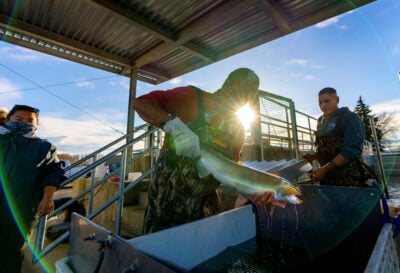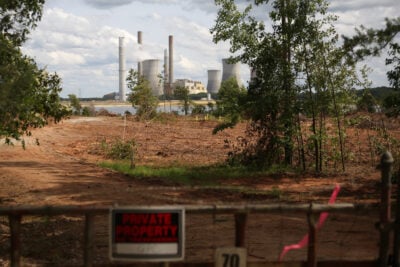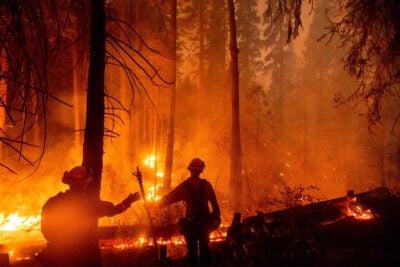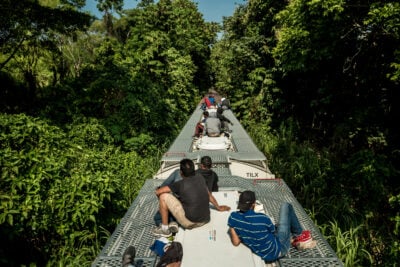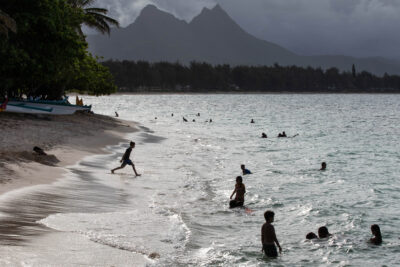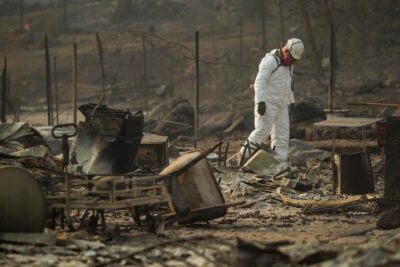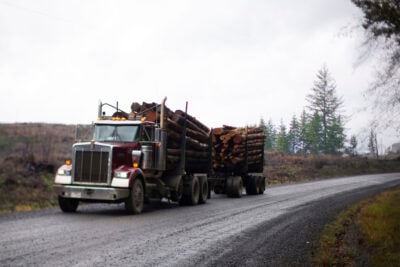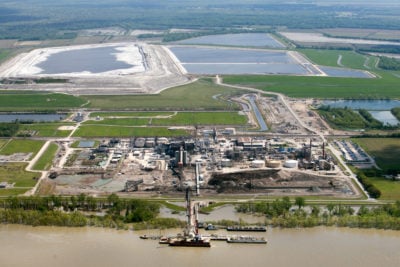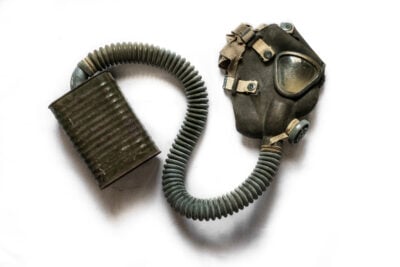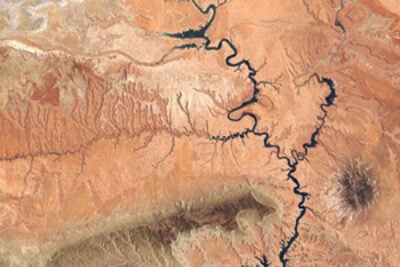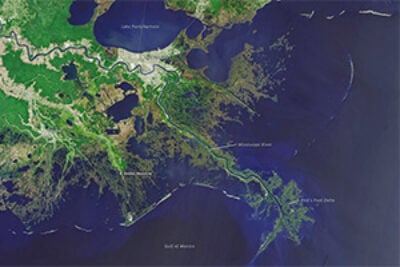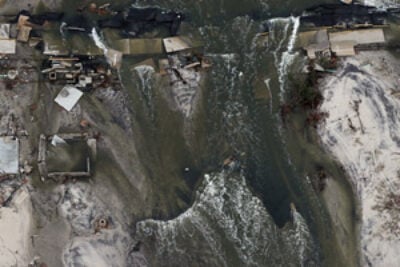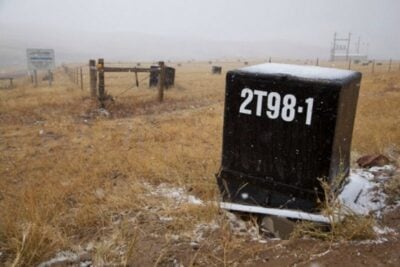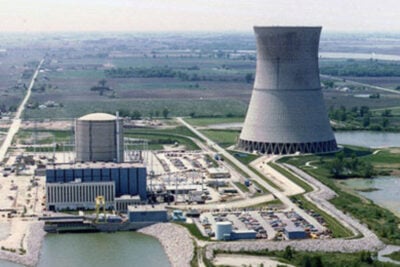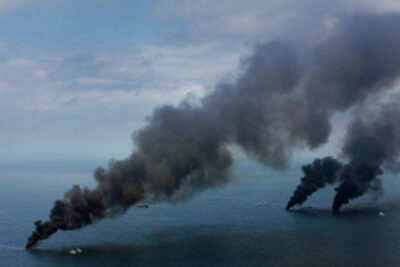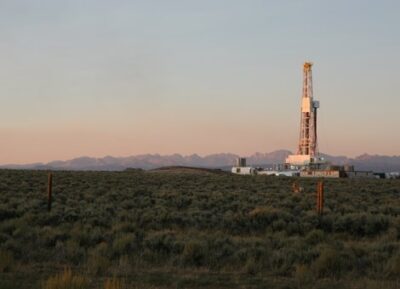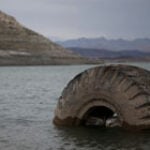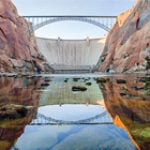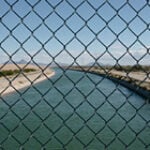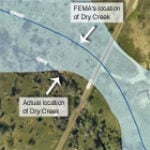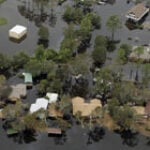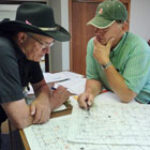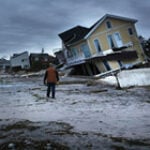Environment
Series
Sunken Costs
Coal Ash in Georgia
California Burning
The Climate Crisis is Setting the State on Fire
The Great Climate Migration
A Warming Planet and a Shifting Population
Paradise Lost
Hawaii’s Disappearing Beaches
Pollution Profiteers
Inside California’s Toxic Hauling Industry
The Cutting
Investigating Industrial Logging in Oregon
Polluter’s Paradise
Environmental Impact in Louisiana
The New Power Brokers
West Virginia’s Natural Gas Industry
Bombs in Our Backyard
Investigating One of America’s Greatest Polluters
Killing the Colorado
The Water Crisis in the West
Losing Ground
Southeast Louisiana is Disappearing, Quickly
After the Flood
The Challenge of Rebuilding as the Climate Changes
Injection Wells
The Hidden Risks of Pumping Waste Underground
Nuclear Safety
After Fukushima
Gulf Oil Spill
Investigating the Impact of the BP Spill
Fracking
Gas Drilling’s Environmental Threat
Stories
The Company Testing Air in East Palestine Homes Was Hired by Norfolk Southern. Experts Say That Testing Isn’t Enough.
“It’s almost like if you want to find nothing, you run in and run out,” says one expert.
Seeding Hope
They set out to save rainforests — and stumbled upon a way to help prevent the world’s next deadly pandemic.
This “Climate-Friendly” Fuel Comes With an Astronomical Cancer Risk
Almost half of products cleared so far under the new federal biofuels program are not in fact biofuels — and the EPA acknowledges that the plastic-based ones may present an “unreasonable risk” to human health or the environment.
What to Know About the Risks of Gas Stoves and Appliances
After learning her gas stove was leaking methane, one reporter consulted public health experts to learn about the scope of the problem and what people can do to reduce these risks at home.
Wildfires in Colorado Are Growing More Unpredictable. Officials Have Ignored the Warnings.
A year after the deadly Marshall Fire drove thousands of Coloradans from their homes, the state’s densest communities aren’t preparing for the next climate-driven wildfire.
This Scientist Fled a Deadly Wildfire, Then Returned to Study How It Happened
In 2021, the devastating Marshall Fire showed wildfire can strike Colorado in almost any place or season. Scientists now hope to glean lessons from it for communities across the West.
A Water War Is Brewing Over the Dwindling Colorado River
Diminished by climate change and overuse, the river can no longer provide the water states try to take from it.
Salmon People: A Native Fishing Family’s Fight to Preserve a Way of Life
This documentary film features the plight of the salmon of the Columbia River and the Native people whose lives revolve around them.
Toxic Salmon Reporting “Deeply Troubling,” Lawmaker Says, Demanding Changes to Protect Pacific Northwest Tribal Health
Citing a ProPublica and Oregon Public Broadcasting investigation into toxic contamination in salmon, state and federal lawmakers across the Pacific Northwest are calling for policy changes and more funding but are lacking details on next steps.
Wealthy Governor’s Company to Pay Nearly $1 Million for Chronic Air Pollution Violations
Bluestone Coke, owned by the family of West Virginia Gov. Jim Justice, signed a consent decree that could allow its Birmingham plant to reopen under stricter oversight.
The Cold War Legacy Lurking in U.S. Groundwater
For the first time, ProPublica has cataloged cleanup efforts at the 50-plus sites where uranium was processed to fuel the nation’s nuclear arsenal. Even after regulators say cleanup is complete, polluted water and sickness are often left behind.
City Receives Half a Million Dollars for Air Monitoring After Report Reveals Elevated Cancer Risk
After years of resident complaints of toxic fumes and health issues, the EPA has funded Mississippi to conduct air monitoring in Pascagoula. This comes a year after a first-of-its-kind analysis by ProPublica into “sacrifice zones” across the country.
The U.S. Promised Tribes They Would Always Have Fish, but the Fish They Have Pose Toxic Risks
For decades, the U.S. government has failed to test for chemicals and metals in fish. So, we did. What we found was alarming for tribes.
Big Oil Companies Are Selling Their Wells. Some Worry Taxpayers Will Pay to Clean Them Up.
Shell and ExxonMobil are selling their California wells despite oil selling at high prices. Experts say one reason is looming liability for environmental cleanup.
Barbados Will Be Among the First to Receive Climate Money From New International Monetary Fund Resilience Trust
Under the program, the Caribbean nation is set to receive $183 million for climate-focused spending from a $45 billion trust set up by the IMF.
New Air Monitors Among Major Impacts of ProPublica Toxic Air Pollution Reporting
Communities identified as “Sacrifice Zones” in a ProPublica analysis of toxic air pollution scored major wins this month. In one, the EPA will start monitoring the air. In another, a judge withdrew permits from a giant petrochemical complex.
The Racism, and Resilience, Behind Today’s Salmon Crisis
Salmon have been endangered my entire life. Here’s what I didn’t realize until I started reporting.
This Hurricane-Ravaged Town Has Waited Years for Long-Term Aid. It Could Happen Again.
Homes and businesses still sit in ruins in a small Louisiana city, left behind by the government’s convoluted and unpredictable system for rebuilding communities devastated by natural disasters.
The Tragedy of North Birmingham
Industrial plants in Birmingham, Alabama, have polluted the air and land in its historic Black communities for over a century. In an epicenter of environmental injustice, officials continue to fail to right the wrongs plaguing the city’s north side.
A Year After Hurricane Ida Caused Flood Deaths, Officials Are Starting to Address Storm Drain Dangers
Following ProPublica’s investigation into flash flood deaths, local and federal governments are working to secure potentially dangerous storm drains.
Texas-Mexico Border Town Approves Air Pollution Monitoring Following ProPublica and Texas Tribune Investigation
Two air monitoring initiatives are moving forward in Laredo after an analysis by the news outlets showed that a plant emitting ethylene oxide elevated the estimated lifetime cancer risk for nearly 130,000 people, including over 37,000 children.
As Colorado River Dries, the U.S. Teeters on the Brink of Larger Water Crisis
The megadrought gripping the western states is only part of the problem. Alternative sources of water are also imperiled, and the nation’s food along with it.
Visualizing Toxic Air
Making data public isn’t enough when it’s incomprehensible to the people it affects. ProPublica set out to decode a complex EPA data set to expose hot spots of industrial air pollution across the U.S.
Joe Manchin’s Price for Supporting the Climate Change Bill: A Natural Gas Pipeline in His Home State
To accommodate the West Virginia senator, Democratic leadership agreed to legislation streamlining permits for the often-stalled Mountain Valley Pipeline and removing jurisdiction from a court that keeps ruling against the project.
How a Federal Agency Is Contributing to Salmon’s Decline in the Northwest
Damming the powerful waters of the Columbia River was a boon for cheap, clean electricity. But the fish that swam those waters are dying out. And the agency in charge isn’t stopping that.
Barbados Resists Climate Colonialism in an Effort to Survive the Costs of Global Warming
Across the Caribbean, soaring national debt is a hidden but decisive aspect of the climate crisis, hobbling countries’ ability to protect themselves from disaster. One island’s leader is fighting to find a way out.
The Supreme Court’s EPA Decision Could Hamper Regulators’ Ability to Protect the Public
The agency will still be allowed to regulate many forms of air pollution, but would need explicit direction from Congress on how to tackle some of the worst aspects of climate change and other pressing issues.
The Polluter Just Got a Million-Dollar Fine. That Won’t Cure This Woman’s Rare Cancer.
Rhonda Fratzke’s oncologist asked if she had ever worked with vinyl chloride, a potent carcinogen. She had not, but she lived near a Westlake Chemical plant that was just fined a million dollars for polluting the air with the dangerous chemical.
Utah Officials Called It the “Year of Water.” Special Interests Still Resist Conservation.
The nation’s fastest-growing and second-driest state had a banner year for water conservation as it plays catch-up to the rest of the West.
Louisiana Sued Hurricane Katrina Survivors for Misusing Recovery Grants. Now It Has Halted Collection Efforts.
Louisiana sued thousands of homeowners for not following the rules in spending grants after Katrina. After a joint news investigation, the state says it hopes a federal agency will approve a settlement that will allow it to drop the lawsuits.
How Not to Count Salmon
Data reporter Irena Hwang thought counting fish to evaluate the hatchery system in the Pacific Northwest sounded like a fun project. That was before she started asking biologists about what the publicly available data could really tell us.
The U.S. Has Spent More Than $2 Billion on a Plan to Save Salmon. The Fish Are Vanishing Anyway.
The U.S. government promised Native tribes in the Pacific Northwest that they could keep fishing as they’d always done. But instead of preserving wild salmon, it propped up a failing system of hatcheries. Now, that system is falling apart.
Air Monitors Alone Won’t Save Communities From Toxic Industrial Air Pollution
Calvert City, Kentucky, has long had what people in other toxic hot spots have been begging for: monitors to prove they’re being exposed to toxic industrial air pollution. Regulators have years of evidence, but the poison in the air is only growing.
Katrina Survivors Were Told They Could Use Grant Money to Rebuild. Now They’re Being Sued for It.
After Hurricane Katrina, struggling homeowners said, they were told not to worry about the fine print when they received grants to elevate their homes. Now the state is going after them because they did exactly that.
The Southwest’s Drought and Fires Are a Window to Our Climate Change Future
In a Q&A with ProPublica, experts describe how a new climate reality threatens the Southwest, the fastest-growing region in the U.S.
She’s Supposed to Protect Americans From Toxic Chemicals. First, She Just Has to Fix Trump’s Mess and Decades of Neglect.
Biden promised to prioritize people over polluters. His pick to deliver that, Michal Freedhoff, is facing a bare-bones budget, demoralized staff and increasingly angry advocates.
State Launches Cancer Study After ProPublica Identifies Toxic Air Pollution Hot Spot
After learning from a ProPublica analysis that his Missouri city had a high estimated cancer risk from toxic air, Verona Mayor Joseph Heck demanded that the state investigate. Health officials confirmed his worst fears and want to learn more.
We’re Releasing the Data Behind Our Toxic Air Analysis
Last year, ProPublica revealed more than 1,000 hot spots of carcinogenic industrial air pollution. Now we’re releasing the data behind that analysis.
Washington State Budgets $1.6 Million for Study and Removal of Toxic Lights
Responding to a Seattle Times and ProPublica investigation, state lawmakers set aside funds after fluorescent lights leaked PCBs at a Seattle-area school for several years. But legislators say it’s only a first step.
Representatives Introduce $500 Million Air Quality Bill, Citing ProPublica’s Investigations
Lawmakers introduced a House bill to fund air monitoring after ProPublica highlighted pollution in its “Black Snow” and “Sacrifice Zones” investigations. The bill is nearly identical to one introduced in the Senate last summer.
Rechaza la EPA la norma de Texas que es más indulgente para un contaminante atmosférico muy tóxico
A raíz de una investigación realizada por ProPublica y The Texas Tribune sobre el óxido de etileno, la EPA ha emprendido medidas para rechazar una norma menos protectora creada por los reguladores de Texas y respaldada por la industria química.
Planta de esterilización de equipo médico contamina con sustancias cancerígenas a decenas de miles de alumnos
Nadie le dijo a la familia de Yaneli Ortiz que la fábrica cerca de la que vivían emitía óxido de etileno. No les dijeron cuando en la EPA se descubrió que causa cáncer. Tampoco cuando le diagnosticaron leucemia.
School District Where Toxic Chemicals Lingered for Years Offers $34 Million Settlement to Families
The settlement would go to nearly 200 students and parents at a Seattle-area school where PCBs are still being cleaned up eight years after they were discovered.
How the Sugar Industry Makes Political Friends and Influences Elections
A city commissioner race in Florida provides a window into how the sugar industry cultivates political allies, who help protect its interests.
What Germany’s Effort to Leave Coal Behind Can Teach the U.S.
The German government agreed to a commitment to transition away from the fossil fuel for environmental reasons. But the obstacles are steep.
EPA Rejects Texas’ More Lenient Standard for Highly Toxic Air Pollutant
In the wake of an investigation by ProPublica and The Texas Tribune into the widely used chemical ethylene oxide, the EPA has moved to reject a less protective standard crafted by Texas regulators and backed by the chemical industry.
EPA Takes Action to Combat Industrial Air Pollution
The EPA announced a raft of targeted actions and specific reforms including stepped-up air monitoring and scrutiny of industrial polluters in the wake of ProPublica’s investigation into toxic hot spots.
California’s Forever Fire
After another devastating year, it’s clear that Californians can’t keep trying to “fight” wildfires. Instead, they need to accept it as their new reality.
After Years of Complaints, Florida Improves Pollution Monitoring Near Burning Sugar Cane Fields
Regulators updated air-monitoring equipment following a ProPublica/Palm Beach Post investigation that found shortcomings in the way authorities police air quality during the cane burning season in Florida’s heartland.
Burning Sugar Cane Pollutes Communities of Color in Florida. Brazil Shows There’s Another Way.
Florida’s largest sugar companies say cane burns are safe and can’t be stopped without economic harm. But Brazil has successfully transitioned away from the controversial practice, and experts there say the U.S. can follow their lead.
A Plant That Sterilizes Medical Equipment Spews Cancer-Causing Pollution on Tens of Thousands of Schoolchildren
Nobody told Yaneli Ortiz’s family that the factory they lived near emitted ethylene oxide. Not when the EPA found it causes cancer. Not when she was diagnosed with leukemia. And not when Texas moved to allow polluters to emit more of the chemical.
How Black Communities Become “Sacrifice Zones” for Industrial Air Pollution
One of the most dangerous chemical plants in America sits in one of West Virginia’s only majority-Black communities. For decades, residents of Institute have raised alarms about air pollution. They say concerns have “fallen on deaf ears.”
The Dirty Secret of America’s Clean Dishes
The world’s largest chemical maker, BASF, produces ingredients for America’s most popular products, from soaps to surface cleaners to dishwasher detergent. Emissions from their U.S. plants elevate cancer risks for an estimated 1.5 million people.
What’s Polluting the Air? Not Even the EPA Can Say.
Despite the high stakes for public health, the EPA relies on emissions data it knows to be inaccurate. To expose toxic hot spots, we first had to get the facts straight.
When Home Is a Toxic Hot Spot
More than a thousand people talked to ProPublica about living in hot spots for cancer-causing air pollution. Most never got a warning from the EPA. They are rallying neighbors, packing civic meetings and signing petitions for reform.
Veneno en el aire
La EPA permite a los contaminadores que conviertan barrios en “zonas de sacrificio” donde los residentes respiran carcinógenos. ProPublica revela dónde están esos lugares en un mapa, el primero de este tipo, y con análisis de datos.
They Knew Industrial Pollution Was Ruining the Neighborhood’s Air. If Only Regulators Had Listened.
Raw throats, burning eyes, strong acid smells. Air monitoring that showed chemicals linked to leukemia. Barbara Weckesser and her neighbors told regulators that air pollution was making them sick. The law let them ignore her.
The EPA Administrator Visited Cancer-Causing Air Pollution Hot Spots Highlighted by ProPublica and Promised Reforms
ProPublica found more than 1,000 toxic air hot spots across the country, and determined Black residents were disproportionately at risk. Environmental experts called the EPA’s response to our investigation historic and a “radical change in tone.”
The Celebrity-Backed Green “Fintech” Company That Isn’t as Green as It Seems
Aspiration is among a group of companies that provide banking and financial services, and promise to help the environment. But so far its marketing is greener than its reality.
El mapa más detallado de contaminación atmosférica industrial que causa cáncer en los EE. UU.
Utilizamos información de la EPA para trazar un mapa de las emisiones atmosféricas industriales que causan cáncer hasta el nivel de los barrios. Busque su casa para ver si usted y sus seres queridos están viviendo en un lugar peligroso.
¿Puede la contaminación del aire causar cáncer? Lo que usted tiene que saber sobre los riesgos.
Si usted vive cerca de ciertas instalaciones industriales, puede tener un riesgo estimado de cáncer más alto. Aquí hay respuestas a preguntas comunes, datos producto de una colaboración participativa y cómo compartir su experiencia.
¿Vive usted cerca de una instalación industrial? Ayúdenos a investigar la contaminación.
Las instalaciones industriales emiten químicos en el aire que elevan el riesgo de cáncer en los barrios de los alrededores. Si usted vive o trabaja cerca de un foco afectado, nos gustaría comunicarnos con usted.
The Most Detailed Map of Cancer-Causing Industrial Air Pollution in the U.S.
Using the EPA’s data, we mapped the spread of cancer-causing industrial air emissions down to the neighborhood level. Look up your home to see if you and your loved ones are living in a hot spot.
Poison in the Air
The EPA allows polluters to turn neighborhoods into “sacrifice zones” where residents breathe carcinogens. ProPublica reveals where these places are in a first-of-its-kind map and data analysis.
Do You Live Near an Industrial Facility? Help Us Investigate.
Industrial facilities release toxic air pollution that can elevate estimated cancer risk for surrounding neighborhoods. If you live in or work near a hot spot, we’d like to hear from you.
Can Air Pollution Cause Cancer? What You Need to Know About the Risks.
If you live close to certain industrial facilities, you may have a higher estimated cancer risk. This may sound alarming. Here are answers to common questions, some crowdsourced tips and how to share your experience to help our investigation.
How We Created the Most Detailed Map Ever of Cancer-Causing Industrial Air Pollution
We analyzed billions of rows of EPA data to do something the agency had never done before: map the spread of cancer-causing industrial air emissions down to the neighborhood level.
“They Deserve to Be Safe”: Candidates Call on Florida to Investigate the Health Effects of Sugar Cane Burning
Voters in Florida's biggest sugar-cane-growing region will soon select their likely representative in Congress. Some candidates are calling on officials to further research industry practices after a Palm Beach Post/ProPublica investigation.
There’s No Cheap Way to Deal With the Climate Crisis
Warming will bring enormous economic costs. Cutting emissions now will save money later.
Rich Homeowners Have Endangered Hawaii’s Beaches With Sand Burritos. The State Is Cracking Down.
Coastal officials in Hawaii are taking action against residents who lined their oceanfront properties with sandbags. A Star-Advertiser/ProPublica investigation last year found that lax enforcement of these protections was threatening beaches.
Conservationists See Rare Nature Sanctuaries. Black Farmers See a Legacy Bought Out From Under Them.
In Pembroke, the well-intended efforts of mostly white nature conservationists overlook one thing: The township’s Black farming community has never fully supported them. Now, a generations-old way of life is threatened by the push for conservation.
Help Us Understand Pacific Northwest Salmon and Treaty Rights
Dozens of people have told us about the decline of wild fish in the Columbia River and the U.S. government’s failure to uphold treaty rights. Now, we’re interested in hearing from you.
Reporting on Climate Injustice in One of the Hottest Towns in America
What does climate injustice look like? A town where farmworkers struggle for access to clean drinking water and comfortable places to sleep while their wealthy neighbors water their lawns generously and park in climate-controlled garages.
40 Million People Rely on the Colorado River. It’s Drying Up Fast.
One of the country’s most important sources of fresh water is in peril, the latest victim of the accelerating climate crisis.
Unlivable Oasis
A family’s housing struggle on the front lines of the climate crisis
We Looked for Some of the Hottest Places in California. We Found Climate Injustice in a Nutshell.
The climate is getting worse across the state. The rich can just afford to protect themselves.
Lawmakers Question California Cap and Trade Policies, Citing ProPublica Report
California legislators asked the state Air Resources Board to review its forest offsets program after an investigation by ProPublica and MIT Technology Review found that up to 39 million carbon credits aren’t achieving real climate benefits.
“A Complete Failure of the State”: Authorities Didn’t Heed Researchers’ Calls to Study Health Effects of Burning Sugar Cane
Health officials in Florida’s sugar belt failed to act on recommendations to study the health impact of cane burning, despite decades of internal research and complaints from residents.
Postcard From Thermal: Surviving the Climate Gap in Eastern Coachella Valley
In the climate crisis, it’s possible to live in the same place but inhabit different worlds.
We Reported on Pollution From Sugar Cane Burning. Now Federal Lawmakers Want the EPA to Take Action.
Citing a Palm Beach Post/ProPublica report on the burning of cane fields, leading members of Congress have called for the EPA to investigate air monitoring in Florida and to change national pollution standards.
Hay humo todos los años. Las compañías azucareras dicen que el aire es saludable.
Para cosechar más de la mitad de la caña de azúcar de Estados Unidos, empresas multimillonarias prenden fuego a los cañaverales, una práctica para ahorrar dinero que está prohibida por otros países. Algunos residentes dicen que les cuesta respirar, así que comenzamos a estudiar la calidad del aire.
Tax-Funded Forest Institute in Oregon Misled Public, May Have Broken State Law, Audit Finds
State auditors found that an agency intended to educate the public about forestry presented biased information favoring the timber industry and possibly violated state law. The audit was prompted by our investigation last year into the agency.
Testing the Air to Tell a Story: How We Investigated Air Pollution Near Florida’s Sugar Fields
A look at the community engagement and citizen data-collection that made our major investigation in the Florida Glades come to life.
The Smoke Comes Every Year. Sugar Companies Say the Air Is Safe.
To harvest more than half of America’s cane sugar, billion-dollar companies set fire to fields, a money-saving practice that’s being banned by other countries. Some residents say they struggle to breathe, so we started tracking air quality.
Sugar Companies Said Our Investigation Is Flawed and Biased. Let’s Dive Into Why That’s Not the Case.
ProPublica and The Palm Beach Post published an investigation into the air quality in Florida’s heartland, where more than half the country’s cane sugar is harvested, often by burning the fields. Sugar companies challenged our reporting. We respond.
Some Hawaii Homeowners Damage Beaches to Protect Their Homes. A New Law Could Help Change That.
Our investigation found property owners were routinely demanding record prices for beachfront homes in Hawaii that are at risk of being sucked into the ocean. Legislators will now require those sellers to disclose the risks to buyers.
Oregon Lawmakers Set Out to Increase the Timber Industry’s Tax Bill. Instead, They Cut It Again.
Legislators cut taxes for the owners of Oregon’s private forests, money that helped fund university forest scientists. Now taxpayers will pick up the tab.
Oregon House Moves to Curb Forest Institute’s Power and Budget
After our investigation found that a tax-funded institute acted as a lobbying arm for the timber industry, Oregon lawmakers passed a bill that would significantly cut the institute’s funding and redirect the money to climate science.
The California Air Resources Board Challenges Our Carbon Credits Investigations. We Respond.
The California Air Resources Board wrote a letter critiquing ProPublica stories that showed flaws in its carbon offset program. Here’s where we disagree with the points the board made.
A Nonprofit Promised to Preserve Wildlife. Then It Made Millions Claiming It Could Cut Down Trees.
The Massachusetts Audubon Society has managed its land as wildlife habitat for years. Here’s how the carbon credits it sold may have fueled climate change.
The Climate Solution Actually Adding Millions of Tons of CO2 Into the Atmosphere
New research shows that California’s climate policy created up to 39 million carbon credits that aren’t achieving real carbon savings. But companies can buy these forest offsets to justify polluting more anyway.
“They’re Trying to Make It So We Walk Away”: It’s About to Get Harder to File Lawsuits Saying Sugar Harvesters Poisoned the Air
Some residents in a rural farming community say sugar harvesting is poisoning the air. The Florida Legislature just passed a bill that would make it harder to sue.
The Coal Plant Next Door
Near America’s largest coal-fired power plant, toxins are showing up in drinking water and people have fallen ill. Thousands of pages of internal documents show how one giant energy company plans to avoid the cleanup costs.
This Billionaire Governor’s Coal Companies Owe Millions More in Environmental Fines
The richest person in West Virginia, who is also the state’s governor, owns coal companies that routinely violate environmental laws. Latest filings say the companies owe over $3 million for not complying with a major water pollution settlement.
A Timber Lobbyist Called Our Investigation “Completely Bogus.” We Have the Receipts to Show It’s Not.
Lobbyists for the timber industry have repeatedly attacked our investigation, which was based on extensive interviews and a review of thousands of documents. Here’s the evidence to back up the investigation’s major findings.
Oregon’s Logging Industry Says It Can’t Afford New Taxes. But Prices Have Never Been Higher and Profits Are Soaring.
Lobbyists claim the timber industry is "up against the ropes." Here's what they're not saying: Lumber prices are at record highs.
Hawaii’s Beaches Are Disappearing. New Legislation Could Help ... if It’s Enforced.
A legal loophole allowed wealthy property owners to protect their real estate at the expense of Hawaii’s coastlines. Now, the state Legislature is considering bills to crack down on the destructive practices, but questions around enforcement remain.
“We Have Counties in Deep Trouble”: Oregon Lawmakers Seek to Reverse Timber Tax Cuts That Cost Communities Billions
For decades, corporate timber benefited from tax cuts that devastated local budgets. Lawmakers want change and have filed dozens of bills, making this one of Oregon’s most consequential sessions for forest policy.
Air Quality Regulators in “Cancer Alley” Have Fallen Dangerously Behind
An audit found that the time it takes the Louisiana Department of Environmental Quality to issue penalties to polluters has doubled. Some companies that have been known to violate air quality rules were able to keep at it for years, or even decades.
The Climate Crisis Is Worse Than You Can Imagine. Here’s What Happens If You Try.
A climate scientist spent years trying to get people to pay attention to the disaster ahead. His wife is exhausted. His older son thinks there’s no future. And nobody but him will use the outdoor toilet he built to shrink his carbon footprint.
The Unfinished Business of Flint’s Water Crisis
Criminal charges and a class-action settlement may seem like the last chapter in Flint’s story, but many of the most important reforms at the root of the city’s water crisis remain undone.
Timber Tax Cuts Cost Oregon Towns Billions. Then Polluted Water Drove Up the Price.
Rural communities in Oregon paid millions of dollars for clean, safe drinking water because the state didn’t protect their watersheds from logging-related contamination.
Hawaii Officials Promise Changes to Seawall Policies That Have Quickened Beach Destruction
Seawalls erode Hawaii’s beaches, but the state has been lax about approving them and disorganized about enforcing the law. Officials now pledge action, after a Honolulu Star-Advertiser and ProPublica investigation.
Officials Let Hawaii’s Waterfront Homeowners Damage Public Beaches Again and Again
Everybody knows that seawalls cause beach loss, and Hawaii law forbids building them. But Honolulu County officials have granted exemptions to 46 homeowners over the past two decades even as a quarter of Oahu’s beaches have disappeared.
Hawaii’s Beaches Are Disappearing
Major islands have lost nearly a quarter of their beaches in the last century. The culprit? Seawalls and other barriers erected by wealthy homeowners.
John Kerry, Biden’s Climate Czar, Talks About Saving the Planet
In the months before the election, Joe Biden’s most influential voice on the issue of our age shared his views on climate migration, open borders, the threat of nationalism, and the challenge posed by China.
The Big Thaw: How Russia Could Dominate a Warming World
Climate change is propelling enormous human migrations as it transforms global agriculture and remakes the world order — and no country stands to gain more than Russia.
Federal Regulators Are Rewriting Environmental Rules So a Massive Pipeline Can Be Built
Federal regulators and West Virginia agencies are rewriting environmental rules again to pave the way for construction of a major natural gas pipeline across Appalachia, even after an appeals court blocked the pipeline for the second time.
How Famous Surfers and Wealthy Homeowners Are Endangering Hawaii’s Beaches
Hawaii’s beaches are public land, which officials are obligated to protect and preserve. But a state agency has repeatedly allowed homeowners, including surfer Kelly Slater, to use tactics that protect property while speeding up the loss of beaches.
A Coal Company Owned by This Billionaire Governor Has Pledged to Stop Breaking Pollution Laws
Gov. Jim Justice's Bluestone Coal Corp. will stop violating water pollution rules, according to a settlement. The company benefited from actions by the West Virginia Department of Environmental Protection, whose secretary Justice appointed.
A Power Company’s Quiet Land-Buying Spree Could Shield It From Coal Ash Cleanup Costs
Georgia Power paid top dollar to buy land from residents living near waste sites at its power plants. Environmentalists fear it’s a tactic to forestall the cleanup bill from new regulations for coal ash.
Oceanfront Property Tied to Obama Granted Exemption From Hawaii’s Environmental Laws
Honolulu officials have granted an exception to the state’s beach protections, clearing the way for a controversial multimillion-dollar renovation of a century-old seawall at a property owned by the chair of the Obama Foundation.
Climate Change Will Make Parts of the U.S. Uninhabitable. Americans Are Still Moving There.
Instead of moving away from areas in climate crisis, Americans are flocking to them. As land in places like Phoenix, Houston and Miami becomes less habitable, the country’s migration patterns will be forced to change.
Permit for Controversial $9 Billion Plastics Plant in “Chemical Alley” to Be Put on Hold
Proposed emissions from the plant would triple the levels of cancer-causing chemicals in one of the most toxic areas of the U.S., but the Army Corps of Engineers intends to suspend the permit.
Despite What the Logging Industry Says, Cutting Down Trees Isn’t Stopping Catastrophic Wildfires
For decades, Oregon’s timber industry has promoted the idea that private, logged lands are less prone to wildfires. The problem? Science doesn’t support that.
The EPA Refuses to Reduce Pollutants Linked to Coronavirus Deaths
Particulate matter kills people. That was true before the pandemic, and new research has tied it to coronavirus deaths. But the EPA is ignoring scientists who say stricter particulate matter limits could prevent tens of thousands of early deaths.
New Maps Show How Climate Change is Making California’s “Fire Weather” Worse
On California’s fall fire days — days with high temperatures and wind speeds, as well as low humidity — all it takes is a spark from a downed power line to start an inferno. New research indicates that they’re about to become a lot more common.
California Will Keep Burning. But Housing Policy Is Making It Worse.
There are ways to keep people and homes safer from wildfires. Then, there’s what California does.
It’s His Land. Now a Canadian Company Gets to Take It.
Federal regulators have given a Canadian oil company the power to seize property from Oregon landowners for a gas pipeline that will help … Canada.
Gov. Gavin Newsom Says California Is Cracking Down on Oil Spills. But Our Reporting Shows Many Are Still Flowing.
After we reported oil companies are making millions from illegal spills, California’s governor defended his administration’s record on oil regulation.
What the Photos of Wildfires and Smoke Don’t Show You
The West will need “good fire” — controlled, managed fire that balances the ecosystem — to stave off deadly, out-of-control fire. We need to know what that looks like.
Oil Companies Are Profiting From Illegal Spills. And California Lets Them.
California may be a global leader on combating climate change, but state regulators have allowed companies like Chevron to make millions from inland oil spills that can endanger workers and damage the environment.
A Wealthy Governor’s Coal Company Might Get a Big Break From His Own Regulators
West Virginia environmental regulators are proposing fine reductions for water pollution violations from a coal company owned by Gov. Jim Justice, even after the company promised to clean up its mines.
Climate Change Will Force a New American Migration
Wildfires rage in the West. Hurricanes batter the East. Droughts and floods wreak damage throughout the nation. Life has become increasingly untenable in the hardest-hit areas, but if the people there move, where will everyone go?
New Climate Maps Show a Transformed United States
According to new data analyzed by ProPublica and The New York Times Magazine, warming temperatures, rising seas and changing rainfall will profoundly reshape the way people have lived in North America for centuries.
New Research Shows Disproportionate Rate of Coronavirus Deaths in Polluted Areas
The type of pollution emitted by many chemical plants in Louisiana's industrial corridor is correlated with increased coronavirus deaths, according to new peer-reviewed research from SUNY and ProPublica.
The Climate Crisis Is Happening Right Now. Just Look at California’s Weekend.
Record high temperatures. Record fires. Record smoke. ProPublica reporter Elizabeth Weil spoke to former California Gov. Jerry Brown about the state’s converging apocalypses.
Oregon Gov. Kate Brown Calls for Audit After Our Reporting on a State Institute That Lobbied for the Timber Industry
The Oregon Forest Resources Institute worked to undercut academic research and acted as a lobbying and public relations arm for the timber industry. Now, the governor has asked for an audit.
The Mystery House: How a Suspicious Multimillion Dollar Real Estate Deal Is Connected to California’s Deadliest Fire
A PG&E employee received a $4.5 million Bay Area home from a vendor, and sold it right back a month later, records show. Later, the utility accused the vendor of bribery for unspecified actions.
Obama and the Beach House Loopholes
Although Hawaii has laws meant to preserve disappearing shorelines, beachfront property owners have been able to bypass them. That’s what happened at an expansive coastal estate officials say the Obamas will live in.
Burial Site Found on a Property Tied to Obama, Causing Tension With Native Hawaiians
After Native Hawaiian remains were found on the multimillion-dollar oceanfront lot being developed by the chair of the Obama Foundation, a state official decided to relocate the remains. Kamuela Kala‘i is speaking up for her ancestors.
¿A dónde se irán todos?
Con el apoyo del Pulitzer Center, ProPublica y The New York Times Magazine modelaron por primera vez las formas en que podrían desplazarse los refugiados climáticos para cruzar fronteras internacionales. Esto es lo que encontramos.
Where Will Everyone Go?
ProPublica and The New York Times Magazine, with support from the Pulitzer Center, have for the first time modeled how climate refugees might move across international borders. This is what we found.
How a PG&E Contractor With a Sketchy Past Made Millions After California’s Deadliest Fire
PG&E overlooked a contractor’s involvement in illicit dumping before hiring it to clean up after the Camp Fire, the deadliest wildfire in California history. PG&E later accused the vendor of fraud for bribing employees and overcharging for services.
Big Money Bought the Forests. Small Logging Communities Are Paying the Price.
Wall Street investment funds took control of Oregon’s private forests. Now, wealthy timber corporations reap the benefits of tax cuts that have cost rural counties billions.
How We Analyzed Data From Oregon’s Timber Industry
A data investigation by OPB, The Oregonian/OregonLive and ProPublica found that timber tax cuts have cost counties at least $3 billion in the past three decades. Here’s how we did our analysis.
The Financial Catastrophe That Coronavirus Brought to Small Towns
The federal government has abandoned America’s small towns as the coronavirus depletes their budgets. It’s flood season and local leaders have no idea how to help residents through natural disasters. “We do not see how we will survive,” one told us.
How Climate Change Is Contributing to Skyrocketing Rates of Infectious Disease
A catastrophic loss in biodiversity, reckless destruction of wildland and warming temperatures have allowed disease to explode. Ignoring the connection between climate change and pandemics would be “dangerous delusion,” one scientist said.
How Louisiana Lawmakers Stop Residents’ Efforts to Fight Big Oil and Gas
Louisiana has pioneered ways for other states to discourage environmental protests around “critical infrastructure” projects. Much of it can be traced back to efforts by corporate lobbyists.
Help Us Understand Logging and Timber Practices Across Oregon
Logging shapes the state’s economy and environment. ProPublica, Oregon Public Broadcasting and The Oregonian are teaming up to report on the issues.
How Oil Companies Avoided Environmental Accountability After 10.8 Million Gallons Spilled
Louisiana still hasn’t finished investigating 540 oil spills after Hurricane Katrina. The state is likely leaving millions of dollars in remediation fines on the table — money that environmental groups say they need as storms get stronger.
How an Environmental Regulator Became Known for Protecting Industry
In the late 1980s, Louisiana’s governor made environmental protection a priority. He only lasted one term. Now, the state’s Department of Environmental Quality has a reputation for going easy on industry.
In “Cancer Alley,” Toxic Polluters Face Little Oversight From Environmental Regulators
Louisiana’s Department of Environmental Quality has been accused of protecting the chemical industry it regulates. The agency is facing cutbacks as new plants are slated for communities that already have some of the country’s most toxic air.
Chemical Companies Are Building Their Plants Overseas and Shipping Them Back In. They Still Get State Tax Breaks.
Louisiana attracts chemical companies with one of the country’s most generous tax exemptions. The idea is to bring jobs to the state. Instead, construction often happens offsite, and automation has cut down on the jobs that remain.
Health Officials in “Cancer Alley” Will Study if Living Near a Controversial Chemical Plant Causes Cancer
Louisiana officials will knock on every door within 2.5 kilometers of the only plant in the country that emits chloroprene, which the EPA calls a likely carcinogen. An analysis said the airborne cancer risk near the plant was the highest in the nation.
What Could Happen if a $9.4 Billion Chemical Plant Comes to “Cancer Alley”
In St. James Parish, Louisiana, a Taiwanese industrial giant seems likely to be granted a permit to build a billion-dollar plastics plant. Its proposed emissions could triple levels of cancer-causing chemicals in one of the most toxic areas of the U.S.
Cap and Trade Is Supposed to Solve Climate Change, but Oil and Gas Company Emissions Are Up
Countries have called California’s cap-and-trade program the answer to climate change. But it is just as vulnerable to lobbying as any other legislation. The result: The state’s biggest oil and gas companies have actually polluted more since it started.
New EPA Rules Aim to Reduce Toxic Emissions. But Many “Cancer Alley” Chemical Plants Won’t Have to Change.
The proposed rules reducing emissions across the country would not apply to many of Louisiana’s chemical plants. These facilities release tons of dangerous, cancer-causing chemicals like ethylene oxide, and more plants are on the way.
Even Louisiana’s Wealthier Neighborhoods Can’t Escape Toxic Air in “Cancer Alley”
Industrial development usually targets poor communities, but Ascension Parish is one of the richest, and most toxic, places in Louisiana. Some residents say the financial benefits of living there outweigh the risks.
In a Notoriously Polluted Area of the Country, Massive New Chemical Plants Are Still Moving In
Data from an EPA model indicates that communities along the lower Mississippi River corridor already face severely elevated cancer risks from industrial activity. Massive new chemical plants are slated to be built there anyway.
Why Louisiana’s Air Quality Is Going From Bad to Worse, in 3 Charts
Welcome to “Cancer Alley.”
How We Found New Chemical Plants Are Being Built in South Louisiana’s Most Polluted Areas
ProPublica and The Times-Picayune and The Advocate investigated the potential cancer-causing toxicity in the air. Using EPA data, public records requests and more, we found that some of the country’s most toxic air will likely get worse.
Welcome to “Cancer Alley,” Where Toxic Air Is About to Get Worse
Air quality has improved for decades across the U.S., but Louisiana is backsliding. Our analysis found that a crush of new industrial plants will increase concentrations of cancer-causing chemicals in predominantly black and poor communities.
I’ve Investigated Industrial Pollution for 35 Years. We’re Going Backwards.
Decades ago, Mark Schleifstein and his colleagues exposed environmental threats coming out of industrial plants all along the Louisiana section of the Mississippi River. A lot of those plants never went away, and even more are moving in.
A Taste of the Climate Apocalypse to Come
PG&E’s rolling blackouts probably don’t eliminate fire risk, and they actually could make responding to fires harder. What they largely do is shift responsibility away from the company.
Inside the Trump Administration’s Chaotic Dismantling of the Federal Land Agency
Internal records from the Bureau of Land Management contradict what its chief told Congress about a plan to ship 200 D.C.-based career staff out West. The plan would weaken the agency, which stands between federal lands and oil, gas and mineral companies.
MIT Media Lab Kept Regulators in the Dark, Dumped Chemicals in Excess of Legal Limit
Documents and interviews show the Media Lab, already under fire for accepting contributions from Jeffrey Epstein, is being investigated for an apparent violation of state environmental regulations. They paused operations after we asked questions.
If Carbon Offsets Require Forests to Stay Standing, What Happens When the Amazon Is on Fire?
The emergency threatening part of the world’s largest rainforest is proof that offsets are too risky to count on to cancel out corporate pollution, and that the Amazon needs help without strings attached.
Proposed California Law Would Punish Companies for Failing to Limit Harm to the Planet’s Forests
The legislation could affect everything from what paper gets used in state offices to what gets served in California cafeterias.
When Fracking Companies Own the Gas Beneath Your Land
Natural gas companies have cut down forests and paved over farms on West Virginia private lands, calling it “reasonably necessary” to access subsurface gas they own the rights to. A new ProPublica documentary chronicles the legal battles.
A Resolution Condemning Pipeline Challengers Passed Easily. A Pipeline Lobbyist Wrote It.
A Dominion Energy lobbyist drafted the resolution and bought meals for its supporters in West Virginia’s legislature. He says there’s nothing unusual about it. The public wasn’t told.
California Legislators Urge Caution, but Greenlight a Plan That Could Lead to the Widespread Use of Forestry Offsets
Influenced by a ProPublica investigation, they emphasized the need for “vigorous and proactive monitoring,” noting concerns long voiced by scientists about the integrity of carbon credits.
United Nations Agency Criticizes Carbon Offsets
A senior official said ProPublica’s recent investigation contributed to questions raised about offsets, which the UN has long supported.
Fracking Companies Lost on Trespassing, but a Court Just Gave Them a Different Win
As conflicts continue between West Virginians and the state’s natural gas industry, complex legal cases are helping some residents, but not others.
Court to Big Fracking Company: Trespassing Still Exists — Even For You
In a key property rights decision, two West Virginia residents scored a rare victory from the state Supreme Court.
Una Verdad (Aún Más) Inconveniente Por qué los créditos de carbono para preservación forestal podrían ser peores que no tener nada
Las ansias por tener estas compensaciones nos ciegan a los alteros de evidencia crecientes que indican que estas no han entregado los beneficios climáticos prometidos, y que no lo harán.
These 4 Arguments Can’t Overcome the Facts About Carbon Offsets for Forest Preservation
Those trying to make them work reacted passionately about ProPublica’s investigation, which found they have failed to deliver the climate benefit they promise. Their arguments come up short.
Uma Verdade (Ainda Mais) Inconveniente: Por que créditos de carbono para preservar florestas podem ser pior do que nada
A corrida pela compensação de emissões está nos fazendo fechar os olhos para evidências cada vez maiores de que não tivemos — nem teremos — os benefícios prometidos.
An (Even More) Inconvenient Truth: Why Carbon Credits For Forest Preservation May Be Worse Than Nothing
How the hunger for these offsets is blinding us to the mounting pile of evidence that they haven't — and won't — deliver the environmental benefit they promise
New Jersey’s $300 Million Nuclear Power Bailout Is Facing a Court Challenge. Does It Have a Chance?
The state’s utility advocate said regulators should not have approved the subsidies for the energy company PSEG.
Nuclear Lobbying Power: N.J. Utility Customers Will Pay $300M in Subsidies
Regulators voted Thursday to approve subsidies, even though PSEG plants are “financially viable.”
In a Time of Cheap Fossil Fuels, Nuclear Power Companies Are Seeking — and Getting — Big Subsidies
Illinois and New York have approved hundreds of millions of dollars in clean-energy incentives for nuclear power companies. New Jersey, Pennsylvania and Maryland could be next.
Residents Say Natural Gas Production Is Marring West Virginia. And the Legislature Isn’t Doing Anything About It.
Though studies recommended additional protections years ago, lawmakers have not taken action to put them in place. But when residents sued, a Supreme Court justice said it was the Legislature’s job.
A Guide to Every Permitted Natural Gas Well in West Virginia
For the first time ever, ProPublica and the Gazette-Mail used software to show over 5,000 permitted wells and the pads on which they sit. Here’s what they look like.
New Jersey Said 10 Years Ago It Would Rank Its Most Contaminated Sites. It Never Did.
The rankings were supposed to ensure that the most dangerous sites remained a priority even as the state gave private companies a bigger role in cleanups. Today, there are nearly 14,000 contamination sites across New Jersey and still no sign of the mandated rankings.
Large Natural Gas Producer to Pay West Virginia Plaintiffs $53.5 Million to Settle Royalty Dispute
As our investigation detailed, EQT Corp. had been accused of deducting a variety of unacceptable charges from natural gas royalty checks. The company says it wants to “turn over a new leaf” in its relationship with the state’s residents.
Scientists Call for Drastic Drop in Emissions. U.S. Appears to Have Gone the Other Way.
A report by a private research company found that U.S. emissions, which amount to one-sixth of the planet's, didn't fall in 2018 but instead skyrocketed. The 3.4 percent jump for 2018, projected by the firm, would be second-largest surge in greenhouse gas emissions from the U.S. since Bill Clinton was president.
Powerless: What It Looks and Sounds Like When a Gas Driller Overruns Your Land
The gas rush is upending communities with traffic and noise, reshaping the way the state looks and sounds. Residents are often powerless to stop it.
California Knew the Carr Wildfire Could Happen. It Failed to Prevent it.
Dozens of interviews and a review of records show that virtually every aspect of the blaze had been forecast and worried over for years. Every level of government understood the dangers and took few, if any, of the steps needed to prevent catastrophe.
He is West Virginia’s Speaker of the House — and a Lawyer for Natural Gas Companies
State ethics rules seldom prevent lawmakers from proposing or voting on legislation that affects industries they work for.
A Hog Waste Agreement Lacked Teeth, and Some North Carolinians Say They’re Left to Suffer
Today, many farmers continue to store the waste in open pits despite the millions of dollars in private investment spent and years of research and political promises. The practice grows more hazardous with each hurricane that pounds the state.
Fuel to the Fire
How a U.S. law intended to reduce dependence on fossil fuels has unleashed an environmental disaster in Indonesia.
Photos: An Indonesian Village That’s Fighting for Its Life
In Bea Nehas, the small plots that homes are built on are in constant jeopardy of being burned to the ground and bulldozed. A sprawling plantation that surrounds the village produces huge volumes of palm oil.
Century-Old West Virginia Leases Yield Paltry Gas Royalties. A Suit Could Cut Others’ Payouts to a Trickle, Too.
Energy giant EQT is challenging a 36-year-old law that gives residents a bigger share of natural gas profits at a time when the industry is flourishing.
West Virginia’s Natural Gas Industry Keeps Pushing to Whittle Away Payments to Residents
Companies are deducting “post-production” costs or creating shell companies to reduce royalty payments. The firms say they have done nothing wrong.
“Jobs Alliance” Backed by Coal Giant Loses Bid To Stop West Virginia Natural Gas Plant
A group backed by Murray Energy has tried to block gas plants in West Virginia. The state Supreme Court rejected arguments against one plant, saying it will help the local economy.
Another West Virginia Supreme Court Justice Declines to Step Aside in Another Natural Gas Case
A lawyer who represented new Supreme Court Justice Evan Jenkins is on the legal team representing the natural gas giant Antero. The opposing side asked Jenkins to recuse himself, but he said no.
Another Court Ruling Against a West Virginia Pipeline, Then Another Effort to Change the Rules
A federal appeals court has revoked a key approval of the Mountain Valley Pipeline. Now, state regulators are working to change the rules — again — so it can proceed.
“Jobs Alliance,” Funded by Trump Backer, Tries to Block Gas Plants That Would Bring Jobs to West Virginia
Murray Energy, one of the nation’s largest coal producers, is paying for lawyers trying to block natural gas plants that would support a growing industry.
“A Never-Ending Commitment”: The High Cost of Preserving Vulnerable Beaches
In the wake of hurricanes like Florence, the U.S. government pays to dump truckloads of sand onto eroding beaches, in a cycle that is said to harm ecosystems and disproportionately benefit the rich.
Congress Passes Measure to Protect Board that Monitors Nuclear Safety
The Energy Department had taken steps to curtail the reach and authority of the Defense Nuclear Facilities Safety Board. New Mexico’s senators are fighting back.
Hurricane Florence’s Surge Is Expected to Hit Homes That Already Cost the Government Millions
The storm is pummeling coastal towns that are battling rising sea levels and have been repeatedly bailed out by federal flood insurance.
Potential Insurance Bill From Hurricane Florence Could Take Toll on Wallets Far From North Carolina’s Coast
Insurance companies retreated from some communities amid stronger storms, leaving a “last-resort” plan to fill the growing gap.
There Was a Plan to Save This City From Flooding. But When the Rains Came, So Did Hesitance.
The Army Corps of Engineers’ delay in activating a floodway — land designated to take on water — cost millions of dollars in damage to Cairo, Illinois, and surrounding communities in 2011.
How the Army Corps’ Hesitation Nearly Destroyed a City
When the worst flood in nearly a century hit Cairo, Illinois, in 2011, the Army Corps waited before following an emergency plan designed to save a city of 2,800 people. See how that week unfolded and the delays and indecision that cost millions in avoidable damage.
New Mexico Senators Speak Out Over Order They Say Would Hamper Nuclear Safety Board
They want Congress to suspend a move that would limit access to information about facilities and could hinder the panel’s ability to oversee worker health and safety.
Natural Gas Industry Again Beats a Tiny West Virginia County That Wanted to Control Its Destiny
A federal judge ruled that Fayette County must allow a natural gas compressor station, saying the federal Natural Gas Act takes precedence over local zoning rules.
Nuclear Safety Board Slams Energy Department Plan to Weaken Oversight
The Trump administration defended an order that could be used to withhold information about nuclear facilities from a federal board, but its leader says the action is not consistent with the U.S. Atomic Energy Act.
How One West Virginia Supreme Court Justice Gave Natural Gas a Big Victory and Shortchanged Residents
Justice Beth Walker voted to reopen an already decided case around the time her husband owned stock in a variety of energy companies. And that’s not even why she’s been impeached.
Defense Inspector General to Investigate Military’s Toxic Open Burning
The inquiry will evaluate whether the polluting practice is legal, and whether contractors have proper oversight.
What Happens When a Pipeline Runs Afoul of Government Rules? Authorities Change the Rules.
Federal authorities halted work on the massive Mountain Valley Pipeline this month after an appeals court ruled that federal agencies neglected to follow environmental protections.
How “Levee Wars” Are Making Floods Worse
High levees come at a high cost, often pushing water into communities that can’t afford the same protection. To demonstrate, we built a giant, scientific model of a river with levees — complete with adorable tiny houses.
Flood Thy Neighbor: Who Stays Dry and Who Decides?
One Missouri town’s levee saga captures what's wrong with America's approach to controlling rivers.
To See How Levees Increase Flooding, We Built Our Own
We ran water through a room-sized river model to show how levees can make flooding worse. Try it yourself.
Undercooked: An Expensive Push to Save Lives and Protect the Planet Falls Short
Millions of lives were at stake. Hillary Clinton was on board. Money poured in. And yet the big aims behind an effort to tackle the plague of third-world cooking fires has produced only modest gains.
How the EPA and the Pentagon Downplayed a Growing Toxic Threat
A family of chemicals — known as PFAS and responsible for marvels like Teflon and critical to the safety of American military bases — has now emerged as a far greater menace than previously disclosed.
Suppressed Study: The EPA Underestimated Dangers of Widespread Chemicals
The CDC has quietly published a controversial review of perfluoroalkyl substances, or PFAS, that indicates more people are at risk of drinking contaminated water than previously thought.
West Virginia Paid for a CEO to Go on a Trade Delegation to China. Turns Out, He Was Promoting His Company’s Interests, Too.
An executive accompanied state officials to China for a ceremony with President Donald Trump to sign a landmark deal last year. He also pushed his company’s interests, which the governor said Friday was not acceptable.
Congress Aims to Force Pentagon Reform on Open Burning of Munitions
A provision of the latest proposed defense spending bill mandates that the Department of Defense address one of its longstanding and dangerous sources of pollution.
Two Leading Bidders for Lucrative Los Alamos Lab Contract Have Checkered Safety Records
Defense contractor Bechtel and the University of California are in the running even though they have run the lab as partners for the last decade and amassed a record of worker health and safety violations.
Get an Inside Look at the Department of Defense’s Struggle to Fix Pollution at More Than 39,000 Sites
For the first time, the Pentagon’s internal database used to track its environmental problems is available to the public.
Climate Change and Vulnerable Communities — Let’s Talk About This Hot Mess.
In my first episode of this PBS Digital Studios show, I dissect why minorities and disadvantaged people will face bigger consequences in a warming world.
The Coal Industry Extracted a Steep Price From West Virginia. Now Natural Gas Is Leading the State Down the Same Path.
“It’s déjà vu for the people who sat here 130 years ago and gave away our coal wealth to big out-of-state companies,” one state senator said. “That’s what we’re about to do again.”
Canary in the Coal Pond
New reports provide an unprecedented look at contaminants leaking from coal ash ponds and landfills. But the chasm between information and environmental protection may deepen thanks to a proposed Trump administration rollback.
Inside a Secretive Lobbying Effort to Deregulate Federal Levees
The effort seeks to undermine federal rules meant to prevent “levee wars” — where communities race to boost their own flood protection at the expense of their neighbors.
New Model Shows Towns on the Wrong Side of an Illinois Levee District Are Treading Water
By building up their own flood protections, some communities have ensured they would be less affected by future floods, while their neighbors would fare worse.
How Overbuilt Levees Along the Upper Mississippi River Push Floods Onto Others
A new analysis of government data shows how levee districts that have raised their levees without federal permits would be better protected against future flooding, while those that follow the rules would see extra flooding.
The Six Stages of Trump’s Resistance
When state regulators tried to get the future president to address a few environmental problems on two golf courses some years ago, little did they know they’d be treated to a multi-year lesson in how he handles regulatory challenges.
Canadian Research Adds to Worry Over an Environmental Threat the Pentagon Has Downplayed for Decades
A study released late last year gives environmental experts a way to quantify how much RDX, a chemical used in military explosives, is spreading into surrounding communities.
Long Story Short
An annotated history of the 30-year fight over a single polluted Air Force base.
War at Home
Unexploded ordnance. Open burns of munitions. Poisoned aquifers. Of all the military’s environmental hazards, the explosive compound RDX may be the greatest threat to America’s health.
Brain Drain At the EPA
Some 300 scientists and environmental protection specialists have departed the agency during the Trump administration.
The Billion-Dollar Loophole
The most generous charitable deduction in the federal tax code is being manipulated to make big profits — and there’s no sign that Congress has any intention of fixing the problem.
What It’s Like Inside the Trump Administration’s Regulatory Rollback at the EPA
The fate of a rule more than a decade in the making is a microcosm of larger changes afoot.
The Bomb That Went Off Twice
The explosive compound RDX helped make America a superpower. Now, it’s poisoning the nation’s water and soil.
Buyouts Won’t Be the Answer for Many Frequent Flooding Victims
Even after Hurricane Harvey, the best efforts by Harris County officials to purchase the most flood-prone homes won’t make a dent in the larger problem — worsening flooding, and a buyout program that can’t keep up.
Book Review: The Ordeal of Appalachia
A new account challenges our notion of how the people of Appalachia “acquired civilization and then lost it.”
FEMA Had a Plan for Responding to a Hurricane in Puerto Rico — But It Doesn’t Want You to See It
The disaster-relief agency, under fire after Hurricane Maria, won’t release the plan, even as a comparable document for Hawaii remains public.
Everyone Knew Houston’s Reservoirs Would Flood — Except for the People Who Bought Homes Inside Them
Despite concerns about flooding in and around the Addicks and Barker reservoirs, government officials prioritized development.
How Military Outsourcing Turned Toxic
Fraud. Bribery. Incompetence. The military’s use of contractors adds to a legacy of environmental damage.
Independent Monitors Found Benzene Levels After Harvey Six Times Higher Than Guidelines
After an oil tank in Houston’s Manchester neighborhood caved in, private monitors found levels that far exceeded California’s health guideline
Rethinking the ‘Infrastructure’ Discussion Amid a Blitz of Hurricanes
Several experts on climate and resilience talk about the role of government. “Viewed correctly, sensible safeguards are part of freedom, not a retreat from it.”
How the Truth Can Get Damaged in a Hurricane, Too
The recent monster storms have kicked up a fair amount of falsehoods. We talk with a reporter trying to hold on to the facts.
Development and Disasters — A Deadly Combination Well Beyond Houston
Scientists warn of more and expanding “bull’s-eyes” as Americans build in parts of the country at ever greater risk because of climate change and severe weather.
Houston’s Dams Won’t Fail. But Many Homes Will Have to Be Flooded to Save Them
The water that goes around the spillways is going to have to leave the reservoir somehow — and enter areas surrounding it.
Trump Has Broad Power to Block Climate Change Report
Influential advisers press the Trump administration to subject a draft climate change report to a “red team” review that many scientists decry as misplaced.
Dangerous Pollutants in Military’s Open Burns Greater Than Thought, Tests Indicate
The first results in a national effort to better measure the levels of contaminants released through the burning of munitions and their waste show elevated levels of lead, arsenic and other toxins.
Has the Moment for Environmental Justice Been Lost?
Facing Trump’s proposals for cutting programs that help minorities and the poor, Democrats scramble to make up for missed opportunities to protect them.
Kaboom Town
The U.S. military burns millions of pounds of munitions in a tiny, African-American corner of Louisiana. The town’s residents say they’re forgotten in the plume.
One Year, One Facility, 1.7 Million Pounds of Hazardous Waste Burned in Open Air
Explore every shipment of hazardous waste sent to Colfax in 2015 and was burned or detonated into open air.
In Colfax, Echoes of Another Conflict
A photographer who covered the war in Iraq appreciates how threats can come to seem routine.
Open Burns, Ill Winds
The Pentagon’s handling of munitions and their waste has poisoned millions of acres, and left Americans to guess at the threat to their health.
Toxic Fires
Across the Country, Military Sites Burn Hazardous Waste Into Open Air
In Flint Water Crisis, Could Involuntary Manslaughter Charges Actually Lead to Prison Time?
Prosecutors will try to prove five Michigan officials were responsible for a Legionnaires’ death because they knew about the problem, but failed to warn the public. Similar cases of environmental disasters have not resulted in convictions, but there are reasons Flint could break the mold.
There Are Lots of Climate Uncertainties. Let’s Acknowledge and Plan for Them With Honesty.
A New York Times column on the climate set off yet another dangerous tempest of exaggeration and simplification.
As One of Its Chief Sources of Water Dries Up, California Eases Restrictions on Use Nonetheless
A single relatively wet winter has led California officials to relax in a way some water experts fear is reckless.
Drought be Dammed
The water crisis in the West has renewed debate about the effectiveness of major dams, with some pushing for the enormous Glen Canyon Dam on the Colorado River to be decommissioned.
‘We’re Sitting Ducks’
Houston, home to millions of people and one of the largest shipping lanes in the world, is unprepared for the hurricane that could bring ecological and economic disaster.
Hell and High Water (Full Text)
Houston is the fourth-largest city in the country. It's home to the nation's largest refining and petrochemical complex, where billions of gallons of oil and dangerous chemicals are stored. And it's a sitting duck for the next big hurricane. Why isn't Texas ready?
Liquid Assets
A maverick hedge fund manager thinks Wall Street is the answer to the water crisis in the West.
How Much Water Does the West Really Have?
As America’s west has waged its battle against water scarcity, some of its officials have been miscalculating to some degree just how much water is actually available. If states in the West keep managing water this way, we risk a water crisis even worse than we fear.
Less Than Zero
Despite decades of accepted science, California and Arizona are still miscounting their water supplies.
Picturing the Drought
Documenting the water crisis in the West, a photographer confronts distress, beauty and man’s complicity.
End of the Miracle Machines: Inside the Power Plant Fueling America's Drought
The Navajo Generating Station helps move trillions of gallons of water over mountains, through canals, 336 miles into Phoenix and Tucson. But it comes at an enormous cost.
A Wonder in Decline
The disappearing Lake Powell in pictures
Use It or Lose It: Across the West, Exercising One’s Right to Waste Water
“Use it or lose it” clauses give farmers, ranchers and governments holding water rights a powerful incentive to use more water than they need.
Welcome to Fabulous Las Vegas, While Water Supplies Last
How 40 years of unchecked growth may eventually bust Las Vegas’ water supply.
The ‘Water Witch’: Pat Mulroy Preached Conservation While Backing Growth in Las Vegas
Despite Pat Mulroy's conservation bona fides, Las Vegas' former water chief put the city's expansion above all else. Did she push Vegas past its limits? “I've had it right up to here with all this ‘Stop your growth,’” she says.
Killing the Colorado: Explore the River
How the Colorado was turned into a giant plumbing system.
Holy Crop: How Federal Dollars Are Financing the Water Crisis in the West
The federal subsidies that prop up cotton farming in Arizona are just one of myriad ways policymakers have refused to reshape laws to reflect water shortages throughout the Colorado River Basin states.
What You Need to Know About the Water Crisis in the West
What led to the West's historic water crisis? What can be done to preserve the Colorado River? ProPublica explores the situation, at a glance.
Sharpening the Government’s Blurry Maps
The Senate may soon vote on legislation that would require FEMA to prepare more accurate maps before flood insurance rates can be raised.
Federal Flood Maps Left New York Unprepared for Sandy — and FEMA Knew It
The agency ignored state and city officials' appeals to update the maps with better data until it was too late.
What Happened After Congress Passed a Climate Change Law? Very Little
The Federal Emergency Management Agency has failed to set up a body that would make recommendations on how to deal with rising seas.
Using Outdated Data, FEMA Is Wrongly Placing Homeowners in Flood Zones
Homeowners have to bear the cost of fixing the agency's mistakes.
Why So Many Flood Maps Are Still Out of Date
A Q&A with Professor David Maidment on what makes today’s maps 10 times more accurate than the ones much of the country is still stuck with
Four Ways the Government Subsidizes Risky Coastal Rebuilding
Certain federal programs encourage developers to build and rebuild in areas that are increasingly vulnerable to flooding and hurricanes.
Without a Final Map, New York Rebuilds on Uncertain Ground
A 2012 law now puts over 67,000 New York City structures at risk of skyrocketing flood insurance rates. Can Bloomberg's ambitious plan save the city's coastal neighborhoods?
As Need for New Flood Maps Rises, Congress and Obama Cut Funding
Funding to update the nation’s decades-old flood maps has been cut in half in recent years, even as extreme weather has grown more frequent.
After Sandy, Government Lends to Rebuild in Flood Zones
A ProPublica/WNYC analysis shows the federal government has approved $766 million to rebuild in areas prone to flooding.
Why 58 Representatives Who Voted for Hurricane Katrina Aid Voted Against Aid for Sandy
Bills that passed almost unanimously in 2005 have run into trouble this time around.
